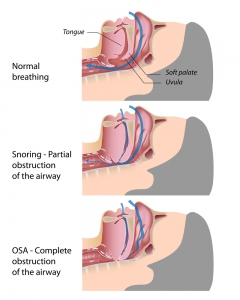Snoring & Sleep Apnoea

What is sleep apnoea?
Sleep apnoea is when breathing stops intermittently during sleep. The most common form condition of this is obstructive sleep apnoea (OSA) and this is frequently managed by sleep physicians and ENT surgeons. In someone with OSA, during sleep the muscles of the upper airway will relax, causing the airway to 'collapse'. This interrupts the flow of oxygen and wakes the person from sleep briefly ('microarousal'). This causes the normal sleep pattern to be disturbed.
What are the symptoms of OSA?
- Snoring
- Daytime sleepiness, a sense of unrefreshing sleep, headaches in the morning
- Reduced memory, mood change and inattention
How is snoring different from OSA?
Snoring is essentially the mildest form of OSA. Snoring is the sound that results from excessive vibration of the upper airway soft tissues (e.g. the soft palate). But it does not have the other features of OSA such as the daytime sleepiness or the memory and attention changes. It is also not dangerous in terms of accident risk and cardiovascular risk (see below).
Is OSA dangerous?
It can be. There is an increased risk of motor vehicle accidents in patients with sleep apnoea and OSA sufferers also have a greater risk of cardiovascular disease.
Because of these reasons, as well as the 'quality of life' effect of the sleep deprivation, OSA in all but its mildest forms needs to be treated.
What are the causes of OSA?
The causes of OSA are multiple. They include things such as:
- Obesity
- Anatomical factors- blocked nose, small jaw, large tongue, large tonsils, reduced muscle tone in the upper airway
- Excessive use of sedatives- including alcohol and sedative medications
How can you treat OSA?
First it needs to be accurately diagnosed with a sleep study. This also helps me to grade the severity of your sleep apnoea.
Secondly, given the range of causes of OSA the treatment options are varied and patient-dependent. This requires detailed assessment by an experienced ENT surgeon and tailoring of a treatment plan to suit you. Treatment may require a combination of lifestyle changes, CPAP, medical treatments, splints or surgery. Arrange a consultation with me if you want to discuss these options in greater detail.